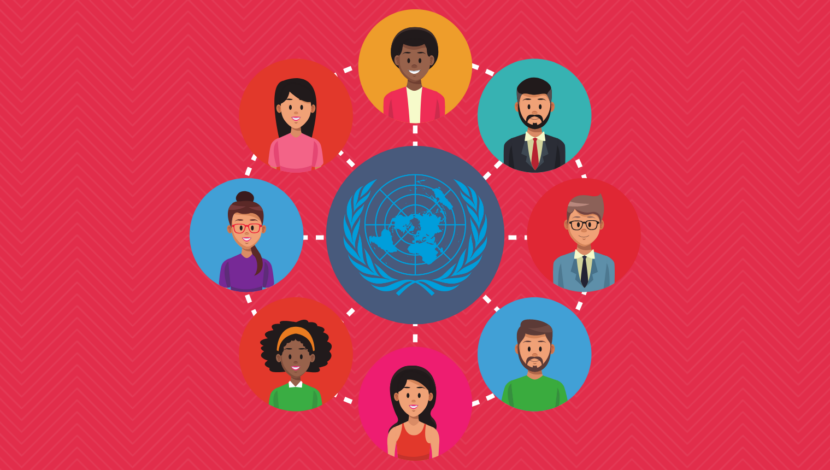The Unitarian Universalist Service Committee advances human rights through grassroots collaborations.
3 Ways the UN Should Advance Human Rights

October 24, 2022
October 24 is United Nations Day—the annual holiday commemorating the creation of the international body in 1945. This year, it arrives at a particularly fitting time. World leaders—acting through UN venues this month and next—have a once-in-a-generation chance to advance human rights and protect humanity’s common interests. If they act now, they can be remembered as the people who averted global catastrophe. If they fail to take bold action, they will go down in history as the leaders who sleepwalked into disaster. These are the steps we urge world leaders to take at the UN in the coming months:
Send the Climate Crisis to the World’s Highest Court
UUSC partners the Pacific Islands Students Fighting Climate Change (PISFCC) are leading a campaign to urge the UN General Assembly to request an advisory opinion on the climate crisis from the UN’s International Court of Justice (ICJ). This groundbreaking step would be the first time the world’s highest court—charged with interpreting international law across the globe—has addressed climate change directly. It would signal that the world community is finally getting serious about the climate crisis as a principal human rights issue of our time. It would also provide much-needed guidance on states’ obligations to respond to the crisis.
Our partners brought this issue before world leaders when they gathered for the UN General Assembly meeting in September, drawing inescapable attention by filling New York’s Hudson and East River with sailboats. As UUSC’s President Rev. Mary Katherine Morn described in a recent blog, she had the chance to witness their grassroots advocacy in action—along with UUSC’s Director of Advocacy, Global Displacement Salote Soqo, and UUSC’s Vice President Rachel Gore Freed—when UUSC co-hosted a side event at the UN gathering to support the call for an ICJ advisory opinion.
PISFCC and other directly-affected climate activists are planning to place a resolution requesting the advisory opinion before the UN General Assembly this month. They will also continue their advocacy on this issue into November, when world leaders will gather for COP27—the annual meeting of the parties to the UN’s core climate change treaties. UUSC members can take action to support this effort by urging U.S. leadership to vote yes on the measure to send this request to the world’s highest court.
Stop Legitimizing Burma’s Genocidal Military
With much of the wealthy Global North’s attention focused on the humanitarian crisis caused by Vladmir Putin’s invasion of Ukraine, world leaders are failing to respond with equal urgency to no less severe crises engulfing other parts of the world—including Burma. The country’s brutal military regime is waging a war against its own citizens that has been just as flagrantly unlawful and vicious as Putin’s invasion, but which has captured far less of the world’s concern.
The result has been a lack of any urgent and substantive policy response from many of the world’s richest and most powerful countries—apart from periodic statements and nominal sanctions. The United States, for instance—while it has finally acknowledged the genocidal character of Burma’s military junta—has stopped short of imposing the oil and gas sanctions that would be needed to hobble the junta’s war against its own citizens.
Even worse than this lack of attention, some of the international community’s responses have arguably served to abet and legitimize the military regime. In particular, advocates warn that some UN humanitarian agencies are seeking to collaborate with the Burmese junta—ostensibly in order to preserve aid-flows into the country. This bankrupt strategy of minimizing human rights concerns in the name of supposedly politics-neutral “humanitarian” objectives has been tried before: it flatly does not work so long as the Burmese junta is itself the biggest cause of the country’s humanitarian crisis.
Instead of trying to cozy up to a genocidal regime, UN humanitarian agencies should be working with civil society actors and neighboring countries to ensure that aid-flows into the country go directly to the people most affected by the military’s crimes—not the pockets of the genocidal junta. A recent op-ed by several international leaders, including a member of the U.S. Congress, offers timely guidance on how the UN could do so. Among other steps, they recommend channeling more humanitarian resources through border regions and working with India and Thailand to ensure open cross-border flows of aid and refugees. World leaders gathered at the UN should take them up on this wise advice.
Protect Global South From Looming Recession
A commission of UN economic experts recently warned that current policies from the Global North risk driving the world economy into a recession. In particular, wealthy countries’ central banks are raising interest rates (a blunt tool for combating inflation that does little to address supply-side causes of price rises), which in turn could spark a debt crisis in already-struggling developing economies. This danger—combined with the rising costs of basic goods, the war in Ukraine, and the compounding effects of the climate crisis—threatens to push even more people into extreme poverty and worsen conditions of life for the Global South.
The global community has an obligation to be in solidarity with the world’s poorest. When UN institutions were founded on this day in 1945, they didn’t promise to protect the interests only of the rich and powerful. They made a commitment to embody the ideal of international solidarity. World leaders who participate in UN bodies have an obligation to advance not only the narrow economic interests of their wealthiest citizens, but the human rights and common good of all. We urge them to embody these founding ideals of the UN in all their policy decisions. A good place to start is with the urgent next steps we propose above.
Image Credit: United Nations